#한국어 배우기
*All verbs below are in original form(dictionary form).
존재하다 : to exist
선언하다 : to declare, proclaim
목격하다 : to witness
제안하다 : to suggest
조언하다 : to advise
개입하다 : to intervene
헌신하다 : to devote
축하하다 : to congratulate
환영하다 : to welcome
접근하다 : to approach
투자하다 : to invest
개선하다 : to improve
응원하다 : to cheer, support
설명하다 : to explain
오해하다 : to misunderstand, misconceive
해결하다 : to resolve
조절하다 : to adjust
계획하다 : to plan
보호하다 : to protect
조사하다 : to investigate
확인하다 : to check, verify, confirm
출발하다 : to depart, set off, start
도착하다 : to arrive, reach
설득하다 : to persuade
양보하다 : to yield, give way
희생하다 : to sacrifice
쟁취하다 : to achieve, win
야기하다 : to cause, bring about
실수하다 : to make a mistake
긍정하다 : to affirm
부정하다 : to deny
생산하다 : to produce
소비하다 : to consume, spend
인정하다 : to admit
소유하다 : to own, possess
봉사하다 : to serve, do volunteer work
유지하다 : to maintain
보조하다 : to assist
인용하다 : to quote, cite
대표하다 : to represent
선택하다 : to choose, select
거절하다 : to reject, refuse
촉진하다 : to promote, accelerate, boost
요구하다 : to demand, ask
사과하다 : to apologize
추측하다 : to guess, suppose
간섭하다 : to interfere
낭독하다 : to read aloud
관찰하다 : to observe
추구하다 : to pursue, seek
Written and edited by Admin Yu
Hello Everyone! This is Admin Sun with a survey on Korean dramas! We would really appreciate it if you could fill this out for us <3 All of us are Native Koreans, so we enjoy hearing foreigners’ opinions on Korean Culture and language! Also, if you’re learning Korean, please take the time to fill out our other survey for foreigners learning Korean <3 Thank you so much! Reblogs are very appreciated
Here’s a small vocabulary list based on words relating to dramas and surveys!
✎드라마 Drama
✎좋아하다 To like
✎주인공 Main Character
✎등장인물 Character
✎배우 Actor
✎대본 Script
✎시점 Point of view
✎촬영하다 To film
✎방송 Broadcast
✎영상 Video clip
✎보다 To see / watch
✎한국어 Korean (language)
✎대중 문화 Pop culture
✎대중 매체 Mass Media
✎문화 Culture
✎인기 Popularity
✎인기 있다 To be Popular
✎연예인 Celebrity
✎출연하다 To appear (in smth)
✎설문조사 Survey
✎배우다 To learn
✎응답하다 To answer
안녕하세요 여러분! Today I have a new kind of lesson for you all: it’s about Hanja! If you don’t know what Hanja is, it’s “Chinese characters borrowed from Chinese and incorporated into the Korean language with Korean pronunciation,” according to Korean Wiki Project. Korean words that feature the same borrowed character often have a shared meaning of some sort, which is why Hanja is good to know! If you know the meaning of one word with a character, you might be able to figure out another word with the same character without even using a dictionary!
To start this series of lessons, I wanted to start with the character 최; I got an ask about some words starting with it and thought it’d be helpful to make a short lesson about it :) I’m also going to post this on my Instagram soon as well, so go check it out there too! Let’s start!

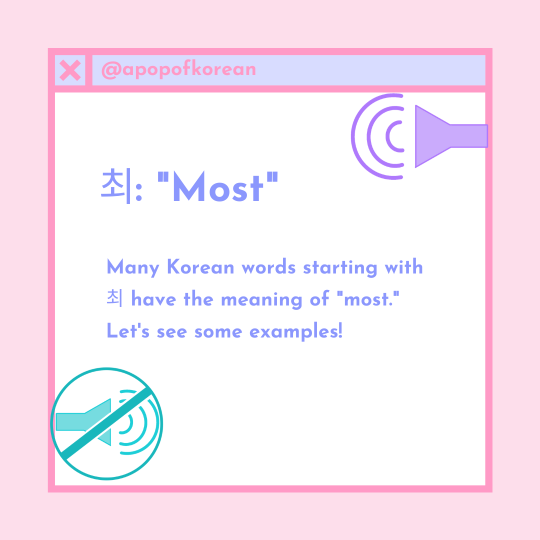


I hope this short list of words has been helpful – let me know what you think and if you’d like to see more of these! Maybe in the future I can break down the entire word – instead of just explaining what 최 means, for instance, I can explain what 애 means too, for example. Lmk your thought! See you in the next lesson! 다음에 또 봐요!
- My masterlist
- Joinmy Discord chat here to practice Korean with others!
- Follow me onInstagram herefor more Korean content!
- GetDrops Premium usingmy affiliate link to expand your Korean vocab!
- Check out myKo-Fi to support this blog and my studies! Thank you for your generosity!
안녕하세요 여러분! Hey everyone! Today I have a lesson with a grammar structure you hear pretty often and it yet another way to say “because” in Korean lol. I also made a post on my Instagram about this structure, so go check that out as well! Let’s start!
Here’s the formula for this structure:
- [verb stem] + 느라고 + [rest of sentence]
- Note that this can only be used with verbs, not adjectives.
- I believe the -고 can be dropped with no difference in meaning.
-느라고 is used to explain a reason for a consequence, and this consequence is usually negative. It can also be used in contexts when your doing one action prevents you from doing the other. Let’s look at some examples:
- 공부하느라고 밤 새웠어요. = I stayed up all night studying.
- Here, you’re explaining what caused you to stay up all night, which was studying.
- 숙제를 하느라고 파티에 못 갔어요. = I couldn’t go to the party because I was busy doing homework.
- The consequence of your doing homework is not not being able to go to the party. One action, doing homework, prevented you from doing the other, which is going to the party.
Let’s see some more examples!
- 늦잠을 자느라고 수업에 못 갔어요. = I didn’t go to class because I overslept.
- 운동하느라고 전화를 못 받았어요. = I was exercising, so I couldn’t pick up your phone call.
- 일하느라고 바빴어요. = I was busy working.
- 요리하느라고 힘들었어요. = I was exhausted after cooking.
- 야근하느라고 집에 늦게 왔어요. = I came home late because I was working overtime.
That’s about it for this lesson! Hope it was helpful! See you in the next one! 다음에 또 봐요!
- My masterlist
- Joinmy Discord chat here to practice Korean with others!
- Follow me onInstagram herefor more Korean content!
- GetDrops Premium usingmy affiliate link to expand your Korean vocab!
- Check out myKo-Fi to support this blog and my studies! Thank you for your generosity!
안녕하세요 여러분! I have another Insta post I wanted to share with y’all! I have a regular lesson about -(으)면 되다 and -(으)면 안 되다 that I made a while back, but I feel like this post is a little more accurate and captures its nuance better. So that’s why I’m posting it here too! I hope it’s helpful!
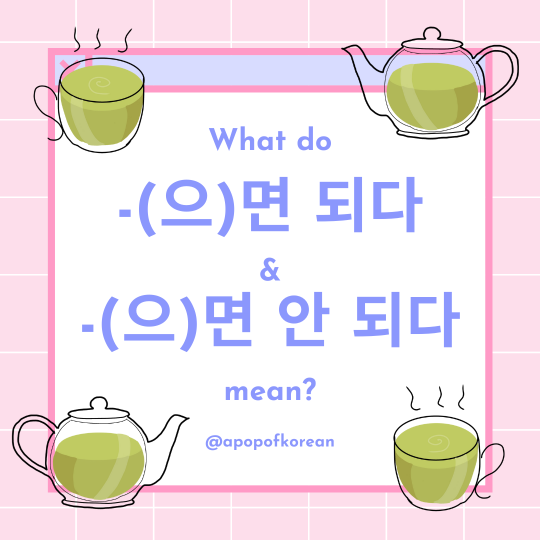


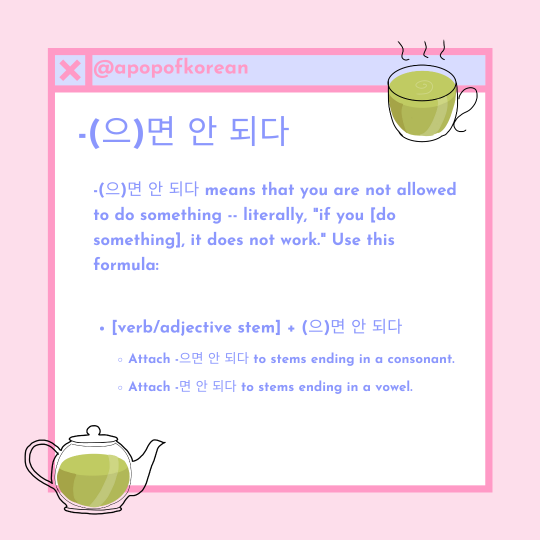

Don’t forget to follow me on Instagram by clicking the link below! Hope this is helpful :) See you in the next lesson! 다음에 또 봐요!
- My masterlist
- Joinmy Discord chat here to practice Korean with others!
- Follow me onInstagram herefor more Korean content!
- GetDrops Premium usingmy affiliate link to expand your Korean vocab!
- Check out myKo-Fi to support this blog and my studies! Thank you for your generosity!
안녕하세요 여러분! Hey everyone! I got a request for a vocab list about K-pop fandom-related words, so here it is! This is a combination of words you might use as a fan and some words related to being an idol. I hope it’s helpful :) Let’s start!
Nouns
- 가사 = lyrics
- 가수 = singer
- 그룹 = group
- (메인, 리드) 댄서 = (main, lead) dancer
- 리더 = leader
- (메인, 리드) 래퍼 = rapper
- 막내 = the youngest member of a group
- (메인, 리드) 보컬 = vocal
- 노래 = song
- 뮤직비디오 = music video
- 뮤비 is short for this.
- 멤버 = member
- 비주얼 = visual
- 밴드 = band
- 안무 = choreography
- 안무 연습 = dance practice
- 아이돌 = idol
- 연습생 = trainee
- 응원봉 = lightstick
- 인터뷰 = interview
- 앨범 = album
- (제일) 좋아하는 멤버 = bias
- 제일 좋아하는 멤버 literally means “favorite member” or “member you like the most.” I often just see 좋아하는 멤버 to mean the same thing, even though it literally means “member that you like.”
- 컴백 = comeback
- 콘서트 = concert
- 콘서트티켓 = concert ticket
- 케이팝 = K-pop
- 포토카드 / 포카 = photocard
- 팬 = fan
- 팬사인회 = fan signing event
- 팬클럽 = fan club
Verbs
- 덕질하다 = to be a die-hard fan of; to be really into
- 노래하다 = to sing
- 노래를 부르다 is another word for “to sing”
- 데뷔하다 = to debut
- 녹음하다 = to record
- 연습하다 = to practice
- 응원하다 = to cheer on; to support
- 촬영하다 = to shoot; to film
- 춤을추다 = to dance
- 컴백하다 = to have a comeback
That’s about it for this list! 제일 좋아하는 밴드가 뭐예요? 코멘트 하세요! What is your favorite band? Leave a comment! See you in the next lesson! 다음에 또 봐요!
- My masterlist
- Joinmy Discord chat here to practice Korean with others!
- Follow me onInstagram herefor more Korean content!
- GetDrops Premium usingmy affiliate link to expand your Korean vocab!
- Check out myKo-Fi to support this blog and my studies! Thank you for your generosity!
안녕하세요 여러분! I got a request to do some possible questions and answers that you might come across if you’re auditioning to be a K-pop idol! I’m not entirely familiar with the audition process or what kinds of questions might be asked of you, but here’s a list based on what I found online. I think that in order to answer these questions in Korean, you should be familiar with beginner/upper-beginner and some intermediate grammar structures and vocabulary. Check out my masterlist linked below to find some lessons that might help you answer them! I hope this is helpful for any aspiring idols! Let’s start!
Questions / 질문
- 이름이 뭐예요? = What is your name?
- 어디에서 왔어요? = Where are you from?
- 어디에 살아요? = Where do you live?
- 몇 살이세요? = How old are you?
- 학교에 어디 다녀요? = Where do you go to school?
- 학교에 어디 다녔어요? = Where did you go to school?
- 무슨 언어를 하세요? = What languages do you speak?
- 노래한 지 얼마나 됐어요? = How long have you been singing for?
- 춤을 춘 지 얼마나 됐어요? = How long have you been dancing for?
- 랩을 한 지 얼마나 됐어요? = How long have you been rapping for?
- 무슨 악기를 하세요? = What instruments do you play?
- 왜 아이돌 되고 싶으세요? = Why do you want to be an idol?
- 가장 좋아하는 가수/밴드 누구예요? = Who is your favorite singer/band?
- 취미가 뭐예요? = What are your hobbies?
Answers / 대답
- 안녕하세요, 제 이름은 [name]입니다. = Hello, my name is [name].
- 저는 [country]에서 왔어요. / 저는 [country] 사람입니다. = I am from [country].
- 저는 [place]에 살고 있습니다. = I live in [place].
- 저는 [#]살입니다. = I am [#] years old.
- Use native Korean numbers when saying your age.
- 저는 [school’s name]에 다녀요. = I go to [school’s name].
- 저는 [school’s name]에 다녔어요. = I went to [school’s name].
- 저는 [language 1], [language 2]하고 [language 3] 합니다. = I speak [language 1], [language 2], and [language 3].
- 저는 노래한 지 [amount of time] 됐어요. = I have been singing for [amount of time].
- 저는 춤을 춘 지 [amount of time] 됐습니다. = I have been dancing for [amount of time].
- 저는 랩을 한 지 [amount of time] 됐습니다. = I have been rapping for [amount of time].
- 저는 [year]년부터 노래했습니다 / 춤을 췄습니다 / 랩을 했습니다. = I have been singing/dancing/rapping since [year].
- 저는 [instrument] 연주합니다. = I play [instrument].
- [reason] 아이돌 되고 싶습니다. = I want to become an idol because [reason].
- 가장 좋아하는 가수는/그룹은 [name]입니다. = My favorite singer/group is [name].
- 제 취미는 [hobby]하고 [hobby] 입니다. = My hobbies are [hobby] and [hobby].
That’s about it for this list! Best of luck to you all :) See you in the next lesson! 다음에 또 봐요!
- My masterlist
- Joinmy Discord chat here to practice Korean with others!
- Follow me onInstagram herefor more Korean content!
- GetDrops Premium usingmy affiliate link to expand your Korean vocab!
- Check out myKo-Fito support this blog and my studies! Thank you for your generosity!
안녕하세요 여러분! Hey everyone! I got another request for a K-pop breakdown, so here it is! This one was pretty tricky for me to break down, but I hope it all makes sense anyways! If you have a song you’d like to see me break down, let me know and I’ll try to fulfill it!
You can listen to this song here! I used lyricstranslate.com’s really good translations and Naver Dictionary to help me out. As usual, I linked my full-length lessons about the grammar structures mentioned if you want to learn more about them! Let’s start!

휘하고 멋지게 솟구치는 눈은 / 이별에 손짓인 듯 부서지는 / 밤으로 가득한 고요를 본다
The snow that soars up majestically with a whoosh / Sees the silence full of night / That is shattered by our goodbye as if it were a gesture
- 휘하다 -> I can’t find a related translation for this word on Naver Dictionary, but just going off the translations from lyricstranslate, it means “with a whoosh.”
- 멋지다 can mean anything from “nice” to “awesome” to “charming.”
- [adjective stem] + 게 turns that adjective into an adverb.
- -고is attached to stems to mean “and.” So 휘하고 멋지게 means “with a whoosh and majestically.”
- 솟구치다 = soar; gush; surge
- 눈 = snow
- [verb] + 는 + [noun] = [noun] that [verbs] -> This is how you describe nouns with verbs in the present tense.
- -은 is a topic particle that shows that 눈 is the topic of the sentence. More about particles here!
- 이별 = farewell; goodbye
- 에 = is a location particle meaning “to” or “in.” In this context, however, it means “by,” as in “shattered by.”
- 손짓 = hand gesture
- [noun] + 인듯 = as if it is [noun]
- 부서지다 = break; be broken; be shattered
- 밤 = night
- 가득하다 = full [of smth]
- -(으)로 in this context means “with” or “of,” as in “filled with night” or “full of night.”
- 고요 = silence
- 보다 = to see
- [verb stem] + ㄴ/는다 or [adjective stem] + 다 is known as the plain style or narrative form. This type of speech doesn’t really have a formality level. You see it a lot in books and newspapers where there’s not really a specific formality level you’re using. It can also be used with those who you would speak informally to.
돌아보는 여운이 안타깝다 / 숨을 쉰다 눈이 온다 / 인사한다 잠이 든다
The afterglow is full of regret / Breathing, snowing / Greeting, falling asleep
- 돌아보다 = to look back
- 여운 = resonance; lingering feeling; echo
- I think 돌아보는 여운 literally means “the resonance I looked back on” or something like that.
- 안타깝다 = regrettable; sad
- 숨을 쉬다 = to breathe
- 눈이 오다 = to snow (literally “snow comes”)
- 인사하다 = to greet
- 잠이 들다 = to fall asleep
- When conjugated into the plain style, the ㄹ gets dropped and replaced with -ㄴ다 because it’s irregular.
떠나간다 / 떠나간다 / 남은 것은 이제 없다
Leaving / Leaving / Now there’s nothing left
- 떠나가다 = to leave
- 남다 = to remain; to be left
- 남은 것 = what’s left; the things that remain
- 이제 = now
- 없다 = to not be there; to not exist; to not have
그대가 웃는 걸 보면서 나도 웃는다 / 발자국에 아쉬움 꾹 묻어둔 채로
As I look at you smile, I smile too / Burying my regret in my footprints
- 그대 = You -> this is a more romantic way of saying “you” that you would say to your partner.
- 웃다 = to smile; to laugh
- 웃는 걸 refers to the fact that you’re smiling. The action of you smiling is turned into a noun, and that is what the speaker is looking at.
- [verb stem] + (으)면서 means “as one [does verb]” and is used for when two actions are done simultaneously.
- 나 = I (informal)
- -도 = too
- 발자국 = footprints
- 아쉽다 = be a shame; be a pity
- 아쉬움 is the noun form of 아쉽다 courtesy of -ㅁ nominalization.
- 꾹 = firmly; completely
- 묻어두다 = hide; bury; conceal
- -ㄴ 채로 describes the state that something is in as an action is being done. In this case, the speaker is smiling with her heart buried – her heart is in the state of being buried as she is smiling.
That’s all for this breakdown – I hope it was helpful! See you in the next lesson! 다음에 또 봐요!
- My masterlist
- Joinmy Discord chat here to practice Korean with others!
- Follow me onInstagram herefor more Korean content!
- GetDrops Premium usingmy affiliate linkto expand your Korean vocab!
- Check out myKo-Fi to support this blog and my studies! Thank you for your generosity!
안녕하세요! Hey everyone! Here is yet another breakdown request fulfilled! If you have a song you’d like to see me break down, let me know and I’ll try to fulfill your request!
You can listen to this song here! I used Genius’s translationsandNaver Dictionary to help me out with this breakdown! I also linked my full-length lessons about the grammar structures featured in this song if you want to learn more about them. Let’s start!

사랑 촌스런 그 감정 / 근데 내 가슴이 뛰어 / 왜 나 이래 나?
Love, that old-fashioned feeling / But why is my heart racing? / What’s wrong with me?
- 사랑 = love
- 촌스런 -> from 촌스럽다, meaning “old-fashioned”
- 그 = that (must be placed before a noun)
- 감정 = feeling
- 근데 can usually be translated as “but” – it is sometimes used to draw attention to a different topic or something contrasting to what is currently being spoken about.
- 내 = my (informal)
- 가슴 = heart; chest
- -이 is a subject particle – more about particles here!
- 뛰다 = to run; to jump
- 왜 = why
- 이래 comes from 이렇다, meaning “to be like this” or “to do this.” This line literally means “why am I like this?” but can also mean “what’s wrong with me?”
나도 모르게 when you call my name / 가슴 아프게 나의 심장이 쿵쿵
Unknowingly, when you call my name / Heartbreakingly, my heart is pounding
- 나 = I/me (informal)
- -도 = too/even (depending on context)
- 모르다 = to not know
- Adding-게 to a verb or adjective stem turns it into an adverb. 나도 모르게 means “unknowingly” or, more literally, “without me even knowing.”
- 아프다 = to be sick; to hurt
- 나의 = another way to say “my.” -의 is a possessive marker.
- 심장 = heart -> This refers more to the heart, while 가슴 can mean either “heart” or “chest.”
- 쿵쿵 is an onomatopoeia and is supposed to mimic the sound of a heartbeat.
내 뜻대로 되지 않아 / 흔한 filter조차 없어
It’s not going my way / I don’t even have any trendy filter
- 내 = my (informal)
- 뜻 = meaning
- -대로 = according to [smth]; as [smth]
- 되다has a few different meanings. In this case, it’s a little hard to translate directly, but I would say it means “to go” (as in to go a certain way) or “to be done” (as in something is done some way).
- -지 않다= not / does not
- More literally, I think this line means “It’s not going according to my meaning.” As with a lot of K-pop lyrics (and Korean in general), it’s best to focus on the meaning rather than the literal English translation, so don’t worry too much if the translation sounds odd!
- 흔하다, according to Naver Dictionary, means “common” or “commonplace.” Not quite sure why Genius translated it as “trendy,” but I guess if something is trendy, it becomes common because everyone is using it.
- [noun] + 조차 = even [noun]
- 없다 = to not be there / to not have
That’s about it for this breakdown! I hope it was helpful :) See you in the next lesson! 다음에 또 봐요!
- My masterlist
- Joinmy Discord chat here to practice Korean with others!
- Follow me onInstagram herefor more Korean content!
- GetDrops Premium usingmy affiliate link to expand your Korean vocab!
- Check out myKo-Fito support this blog and my studies! Thank you for your generosity!
안녕하세요! Hello again everyone! I have yet another breakdown that was requested! If there’s a song you want to see broken down, let me know and I’ll try to fulfill your request!
You can listen to this song here! I used colorcodedlyrics.comandNaver Dictionary to help me translate these lyrics! I also linked my full-length lessons about the grammar structures featured in this song if you want to learn more about them. Let’s start!

거울 속에 마주친 얼굴이 어색해서 / 습관처럼 조용히 눈을 감아 / 밤이 되면 서둘러 내일로 가고 싶어
The face in the mirror is awkward / So like a habit I quietly close my eyes / When the night comes I want to hurry up and go to tomorrow
- 거울 = Mirror
- 속에 = Inside
- 마주치다 = to meet (usually refers to eyes meeting)
- 얼굴 = face
- -ㄴ/은allows you to describe nouns with that verb in the past tense. So 마주친 얼굴 literally means “the face that I met.”
- -이 is a subject particle – more about particles here!
- 어색하다 = awkward
- -아/어서 means “so” or “because.” 어색해서 means “because it’s awkward” or “it’s awkward, so…”
- 습관 = habit
- [noun] + 처럼 = like [noun]
- 조용하다 = quiet; 조용히 = quietly
- 눈 = eye(s)
- 감다 = to close (when talking about eyes)
- 밤 = night
- 되다 = to become (밤이 되다 literally means “to become night”)
- -(으)면 = if/when
- 서두르다 = to rush; to hurry
- 내일 = tomorrow
- -(으)로in this context means “to” or “towards.”
- 가다 = to go
- [verb stem] + 고 싶다 = I want to [verb]
설렘으로 차오르던 나의 숨소리와 / 머리 위로 선선히 부는 바람 / 파도가 되어 어디로든 / 달려가고 싶어 / 작은 두려움 아래 천천히 두 눈을 뜨면
My breath that rose up with excitement / And the wind that blows coolly above my head / I want to become a wave / And run anywhere / When I slowly open my eyes under the small fears
- 설렘 = excitement; thrill
- Here, -(으)로 means “with”
- 차오르다 = to rise up
- 나의 = my (informal) -> 나 means “I,” while -의 is a possessive marker.
- 숨소리 = breath -> refers to the sound of breath
- [verb stem] + 던is another way to describe a noun with a verb. It is used for actions that you used to do repeatedly in the past or that you did but did not complete.
- -와 = and
- 머리 = head
- 위로 = above; top
- 선선히 = coolly
- 불다 = blow
- 불다’s stem ends in ㄹ, which gets dropped when you want it to describe a noun.
- 바람 = wind
- 파도 = wave
- 어디로든 = anywhere
- 달려가다 = to run
- 작다 = small
- 두려움 = fear -> noun form of the verb 두렵다, meaning “afraid”
- 아래 = below; bottom
- 천천히 = slowly
- 두 = two (this is the word for “two” that you put before a noun)
- 뜨다 = to open (eyes)
휩쓸려 길을 잃어도 자유로와 / 더이상 날 가두는 / 어둠에 눈 감지 않아 / 두 번 다시 날 모른 척 하지 않아
I’m free even when I’m swept away and get lost / I won’t close my eyes / in the darkness that traps me anymore / I won’t pretend to not know who I am again
- 휩쓸리다 = to be swept away
- 길을 잃다 = to get lost
- -아/어도 = even though/even if
- 자유롭다 = to be free
- 더이상 = anymore
- 날 = me (informal)
- 가두다 = to trap; to confine; to lock up
- 어둠 = darkness
- -지 않다 = to not [verb/adjective]
- 두 번 = twice
- 다시 = again
- 모르다 = to not know
- -척 하다 = to pretend to [verb/adjective]
That’s about it for this breakdown! Hope it was helpful and fun to read! See you in the next lesson! 다음에 또 봐요!
- My masterlist
- Joinmy Discord chat here to practice Korean with others!
- Follow me onInstagram herefor more Korean content!
- GetDrops Premium usingmy affiliate link to expand your Korean vocab!
- Check out myKo-Fi to support this blog and my studies! Thank you for your generosity!
안녕하세요 여러분! Hey everyone! I got yet another request for a breakdown! If you have a song you’d like to see broken down, let me know! I linked my full-length lessons about the featured grammar points throughout as well in case you want to learn more about them!
I translated all these lyrics myself, but I did refer to this lyric videoandNaver Dictionary to help me out :) Let’s start!
나를 스쳐가는 그대 / 내 말을 들어줘 / 걸음을 멈추고 / 내 노랠 들어줘
You brush against me / Listen to what I have to say / Stop in your tracks / And listen to my song
- 나를 = me
- 나 is the informal way to say “I,” while -를 is an object particle. More about particles here!
- 스쳐가다 = to brush against; to pass by
- 그대 = you -> This is a poetic/romantic way to say “you” and isn’t really used in everyday spoken Korean.
- [verb stem] + 는 allows you to describe nouns with that verb. 나를 스쳐가는 그대 literally means “you who brushes against me.”
- 내 = my (informal)
- 말 = words
- 듣다 = to listen; to hear
- 듣다’s stem ends in ㄷ, so it becomes 들어줘 when conjugated.
- [verb stem] + 아/어주다 means that a verb is done forsomebody and can be used when pleading that someone do something for you. In this case, he’s commanding that you listen to him.
- Literally, this line means “listen to my words.”
- 걸음 = step(s) -> from the verb 걷다, meaning “to walk”
- 멈추다 = to stop
- -고 is a connector that means “and.” This line means “stop in your tracks and…”
- 노래 = song
축 처진 고개들과 / 비틀거리는 그림자 / 그렇게 나는 불청객이 돼 / 아무도 모르는 yeah / 노래를 부르며 yeah
Among the drooping heads / And staggering shadows / I become an uninvited guest / While I sing a song / That nobody knows
- 축 처지다 = droop; hang; sag
- 고개 = head
- Attach -들 to nouns to make them plural
- [verb stem] + ㄴ/은 allows you to describe a noun with that verb in the past tense. So 축 처진 고개들 literally means “heads that drooped.”
- 과/와is attached to nouns to mean “and” or “with.” 과 is attached to nouns ending in a consonant, while 와 is attached to those ending in a vowel.
- 비틀거리다 = stagger; stumble; falter; totter
- 그림자 = shadow(s) (it can still be implied that a noun is plural without the -들 depending on the context!
- 그렇게 = like that
- 불챙객 = uninvited guest
- 되다 = to become
- These lines were a little tricky to translate, but I think it essentially means “the drooping heads and staggering shadows, like that, I become an uninvited guest” as if he is an uninvited guest because the drooping heads and staggering shadows make him one.
- 아무도 = nobody
- 모르다 = to not know
- 아무도 모르다 sounds like a double negative – nobody doesn’t know. But in Korean, this is the correct way to say “nobody knows”! When using indefinite pronouns like 아무것도, 아무데도, (nothing, nowhere), etc., you need to use a negative verb like so.
- 부르다 -> when paired with 노래, means “to sing.”
- [verb stem] + (으)며means “while [verb]” and is used when two actions are happening at the same time.
아무도 모르는 / 노래를 부를래 / 지나가는 너의 / 마음을 붙잡을 수 있길 바라며
I’ll sing a song / That nobody knows / Hoping that I can grasp your heart / As it passes
- [verb stem] + ㄹ/을래(요) means “I will [verb]” or “I want to [verb].” It expresses a strong intention to do something.
- 지나가다 = pass; go by
- 너의 = your(informal)
- 너 means “you” (informal), and -의 is a possessive marker.
- 마음 = hear
- 붙잡다 = grasp; grab; hold
- [verb stem] + ㄹ/을 수 있다 = can [verb]
- [verb stem] + 기를 바라다 = to hope that [verb]
- Those last two lines literally mean “while hoping I can grasp your passing heart.”
That’s about it for this breakdown! Hope it was helpful :) See you in the next lesson! 화이팅!
- My masterlist
- Joinmy Discord chat here to practice Korean with others!
- Follow me onInstagram herefor more Korean content!
- GetDrops Premium usingmy affiliate link to expand your Korean vocab!
- Check out myKo-Fi to support this blog and my studies! Thank you for your generosity!
안녕하세요 여러분! Hey everyone! I have another Hanja lesson for y’all today – this one is about two possible meanings of 악! I’m planning on posting this to my Instagramtomorrow as well, so be sure to follow me there for more Korean content! I hope this is helpful, and you can let me know if you have any questions! 화이팅!
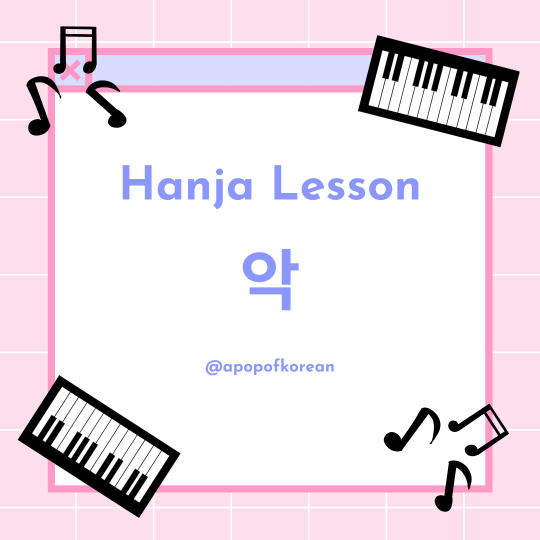
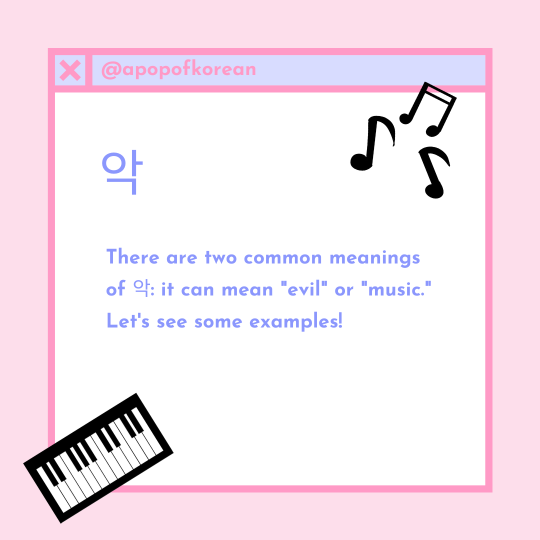
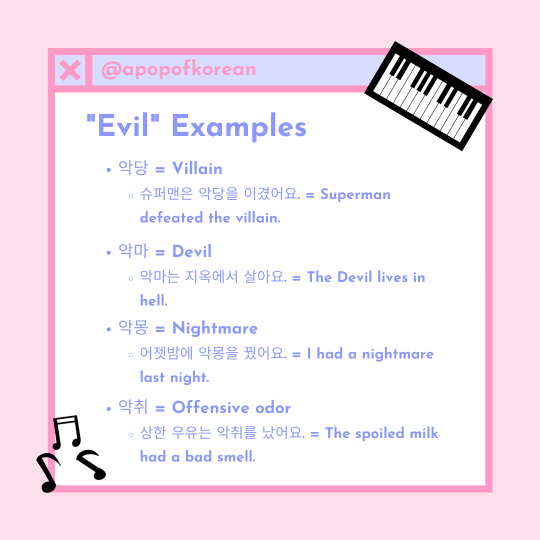
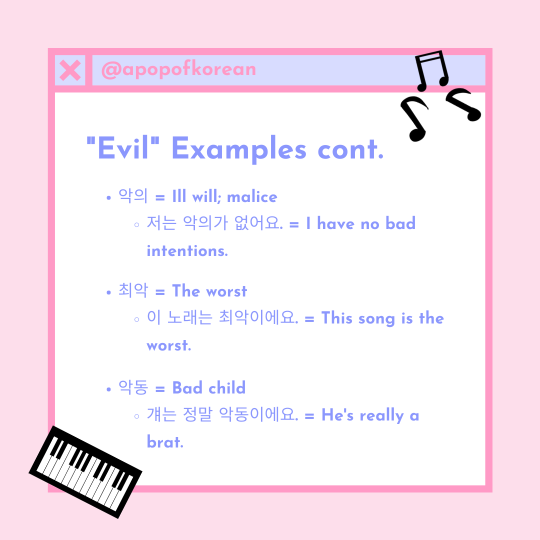


- My masterlist
- Joinmy Discord chat here to practice Korean with others!
- Follow me onInstagram herefor more Korean content!
- GetDrops Premium usingmy affiliate linkto expand your Korean vocab!
- Check out myKo-Fi to support this blog and my studies! Thank you for your generosity!
안녕하세요 여러분! I have another Hanja lesson for y’all – this one is about 수! This lesson doesn’t list every single possible meaning of 수, but these are some common ones. You can find this post on my Instagram as well; be sure to follow me there for more Korean content! I hope this is helpful!

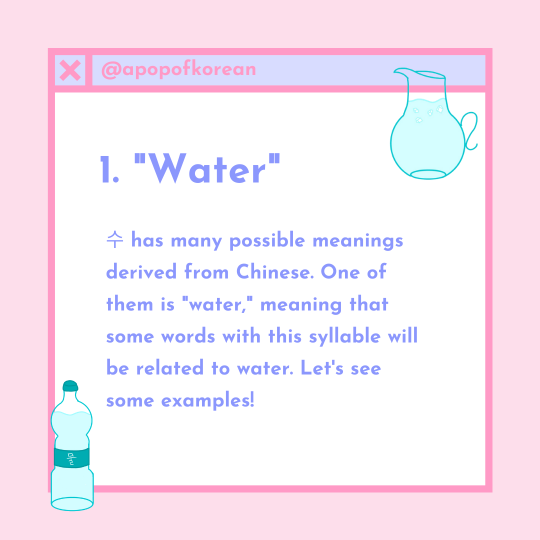
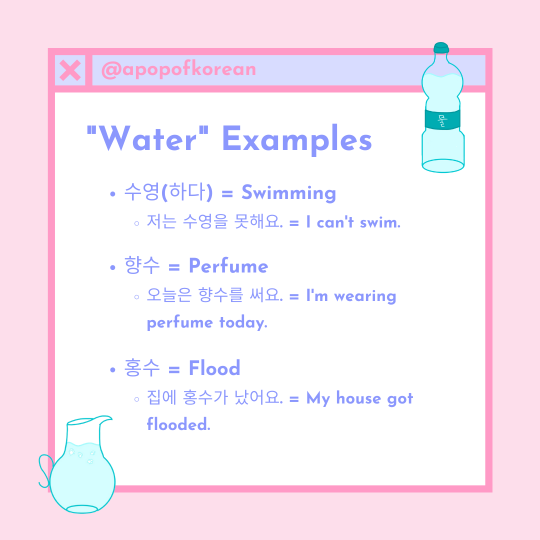

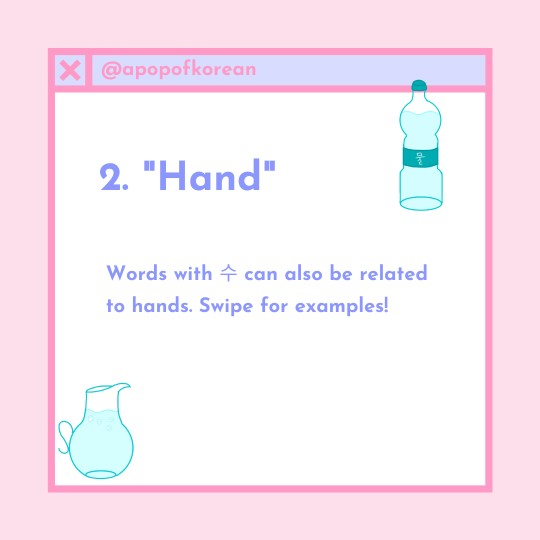
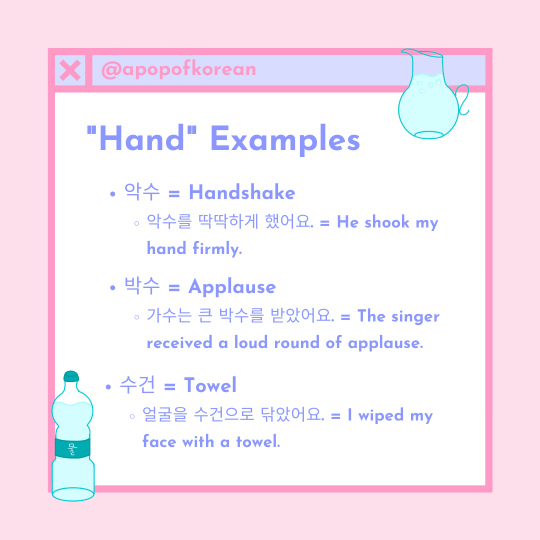
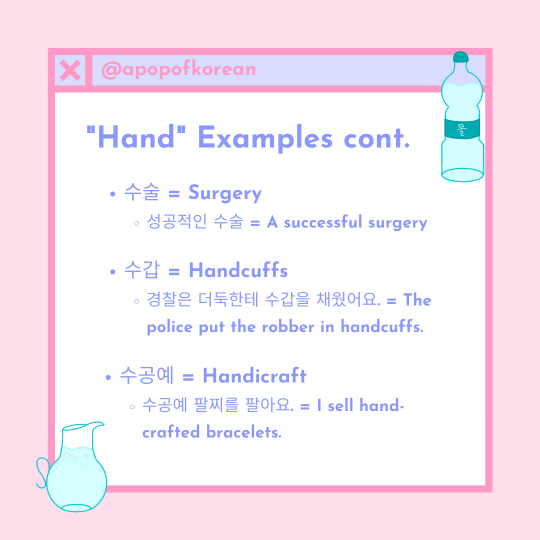

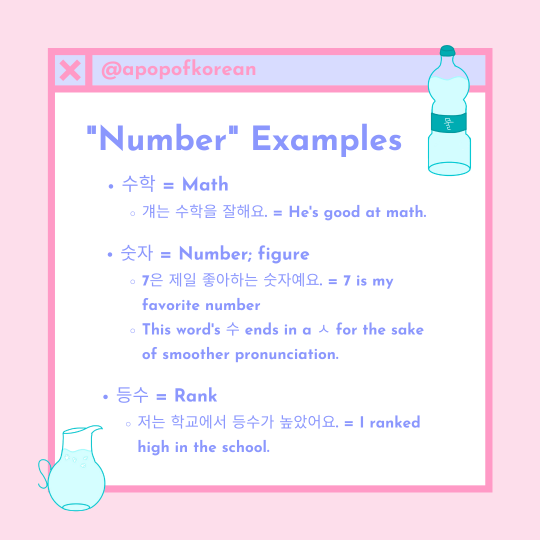
- My masterlist
- Joinmy Discord chat here to practice Korean with others!
- Follow me onInstagram herefor more Korean content!
- GetDrops Premium usingmy affiliate link to expand your Korean vocab!
- Check out myKo-Fito support this blog and my studies! Thank you for your generosity!
안녕하세요 여러분! Hey everyone! Today’s lesson is about -고 보니까, which is one way to express realization. Let’s start!
Use this formula:
- [verb stem] + 고 보니까 + [rest of sentence]
- The -까 can be dropped with no difference in meaning.
This structure is used to express your realization after you finish doing an action. Let’s look at an example:
- 한국어 수업을 듣고 보니까 꽤 어렵더라고요. = After taking a Korean class, I’ve realized that it’s quite difficult.
This sentence communicates your realization after you completed the action of taking a Korean class, that realization being that Korean is difficult to learn. I want to emphasize that this structure can only be used when talking about a completed action, not one that is currently in progress.
Notice that this structure is seen in sentences that have other endings communicating some sort of realization or surprise like 것 같다, -네요,and-더라고요. Let’s see some more examples!
- 책을 다 읽고 보니까 생각보다 재미있어요. = After reading the book, I see that it’s more interesting than I thought.
- 그러고 보니까 그 콘서트 표는 꽤 비싸네요. = Now that I think about it, that concert ticket it quite expensive.
- 그러고 보니 is a fixed expression meaning “now that I think about it” or “come to think of it.”
- 처음에는 김치를 싫었는데 다시 먹어보고 보니 괜찮더라고요. = At first, I didn’t like kimchi, but after trying it again, it’s okay.
- 원래는 걔가 좀 차가운 것 같지만 더 친해지보니 아주 착하네요. = Originally I thought she was a little cold, but now that I’ve gotten closer to her, she’s very nice.
That’s about it for this lesson! Lmk if you have any questions :) See you in the next one! 다음에 또 봐요!
- My masterlist
- Joinmy Discord chat here to practice Korean with others!
- Follow me onInstagram herefor more Korean content!
- GetDrops Premium using my affiliate link to expand your Korean vocab!
- Check out myKo-Fito support this blog and my studies! Thank you for your generosity!
VOCABULARY WORDS #2 (어휘)
Family - 가족
Grandfather - 할아버지
Grandmother - 할머니
Father - 아버지
Mother -어머니
Younger brother - 남동생
Younger sister - 여동생
Son - 아들
Daughter - 딸
Husband - 남편
Wife - 아내
Younger sibling - 동생
(from a male perspective)
Older brother -형
Older sister - 누나
(from a female perspective)
Older brother - 오빠
Older sister - 언니
Interrogative pronouns
Who - 누구
Who - 누가 (누구+가(subject marker))
What - 무슨
Personal pronouns
My - 나의 / 내 /제
Our - 우리
(honorific)
This person - 이분
That person - 그분
That person - 저분
Other helpful vocabulary words:
Company - 회사
To work for / to go to - 다니다
Flower - 꽃
Rose - 장미
Library - 도서관
Morning - 아침
Nurse - 간호사
Counting unit for people - 명
College student - 대학생
To love - 사랑하다
to be right - 맞다
Really - 정말
Photograph - 사진
To be pretty - 예쁘다
To marry - 결혼하다
Last year - 작년
[ActiveKorean2]
Hi, it’s been a long time since I posted here and decided to be active again. As of the moment, I can’t think of any korean related lesson to post. Any suggestions? :)
VERB PER DAY #3
하다 - to do
Past tense - 했어요
- A:어제 뭐 했어요?
- What did you do yesterday?
- B:나의 숙제를 했어요.
- I did my homework.
어제 - yesterday
뭐 - what
나의 - my
숙제 - homework
Present tense - 해요
- A:무슨 일을 해요?
- What work do you do?
- B: 저는 의사예요.
- I am a doctor.
무슨 - what; what type; what kind
일 - work
의사 - doctor
Present progressive - 하고 있어요
- A:뭐 하고 있어요?
- What are you doing?
- B:운동을 하고 있어요.
- I am exercising.
운동 - exercise (noun)
Future tense - 할 거예요
- A:너 왜 이렇게 빨라요?
- Why are you so fast?
- B:제 친구가 기다려서 내가 이거를 그냥 빨리 할 거예요.
- My friend is waiting so I’ll just do this quickly
너 - you
왜 - why
이렇게 - so; in a manner; in a way; like this
빠르다 - to be fast (빨라요 - present tense)
제 - my
친구 - friend
기다리다 - to wait
이거 - this
그냥 - just
VERB PER DAY #2
보다 - to see
Past tense - 보 + -았어요 = 봤어요
- 어제 뭐 했어요?
- What did you do yesterday?
- 친구랑 같이 영화를 봤어요.
- I watched a movie with my friend.
Present tense - 보 + -아요 = 봐요
- 요즘 뭐 해요?
- What do you do these days?
- 영화를 봐요.
- I watch movies.
Present progressive - 보 + -고 있어요 = 보고 있어요
- 지금 뭐 하고 있어요?
- What are you doing now?
- 지금 텔레비전을 보고 있어요.
- I am watching TV now.
Future tense - 보 + -ㄹ 거예요.
- 내일 뭐 할 거에요?
- What will you do tomorrow?
- 내일 공원에서 폭죽을 볼 거예요.
- I will watch fireworks tomorrow at the park.
VERB PER DAY #1
먹다 - to eat
Past tense - 먹었어요
- 저는 어제 피자를 먹었어요.
- I ate pizza yesterday.
Present tense - 먹어요
- 오후 열두 시에 점심을 먹어요.
- I eat lunch at 12 pm.
Present progressive - 먹고 있어요
- 지금 빙수를 먹고 있어요.
- I am eating bingsu now.
Future tense - 먹을 거예요
- 나중에 친구들이랑 냉면을 먹을 거예요.
- I will eat naengmyeon later with my friends.
This is vocabulary from “Oh! My Mistake (예쁜 게 죄)” by APRIL (에이프릴). All verbs are in their infinitive form and the list is in alphabetical order.
갖다 - to have
계속 - continuously
그리다 - to depict
기쁨 - joy/happiness
꽃 - flower
나비- butterfly
낮 - daytime
녹다 - to melt
눈빛- expression in one’s eyes
느낌 - feeling
다가오다 - to come closer
달콤하다 - to be sweet
떠오르다 - to come up
떨리다 - to tremble
마음 - heart
마치 - as if
만들다 - to make
망설이다 - to hesitate
매번 - every time; always
문제 - problem
믿다 - to believe
바라보다 - to look at
반짝이다 - to glitter
반하다 - to fall in love (with)
밤 - night
보내다 - to send
빛 - gleam/light
빠지다- to fall (for)
빨개지다 - to turn red
사라지다 - to disappear
사랑하다 - to love
사탕 - candy
상상 - imagination
새벽 - dawn
생각 - thought
손길 - touch
스치다 - to brush (past/against)
시선 - one’s eyes
신호 - signal
아픔 - pain
앉다 - to sit
얼굴 - face
예쁘다 - to be pretty
외롭다 - to be lonely
웃음 - smile
원래 - originally
원하다 - to want
유혹하다 - to tempt
자꾸 - again and again
제발 - please
좋아하다 - to like
죄 - sin; crime
준비 - preparation
진심 - sincerity
태어나다 - to be born
표정 - facial expression
핑크 - pink
함께 - together
홀리다 - to be bewitched (by)
